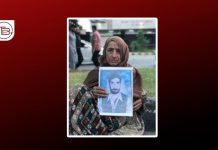By Hammal Baloch
For any revolutionary, politics or war is a permanent act against the oppressor unless their land is free from foreign invasion, and their people have the right to self-determination. In revolutionary politics or war, there are two types of ends: long-term and short-term. However, a true revolutionary always prioritizes the long-term end, as their noble cause is to liberate their people from foreign power and influence, and establish their nation as a powerful force on the world stage. Unity and positivity become crucial responsibilities for a group of revolutionaries fighting against the curse of slavery as a nation.
When we hear debates on unity among Baloch parties or armed fronts, it gives hope to me and many others who support the Baloch liberation movement. Unity among Baloch mass parties is essential in the face of the current divisions. The British, former invaders of Baloch land (albeit in terms of foreign affairs and internal rule only), adopted the divide and rule policy, which the present invader, Pakistan, cannot successfully implement as a colonizer. Pakistan, like many other countries in Asia and Africa, is in a phase of neo-colonization. However, I would rather refer to Pakistan as a policy rather than a state. Let us follow the present world order and call it a state, or a failed policy that considers itself a state and serves its vested interests. Nevertheless, the failed state continues to rule Balochistan, not because it is strong, but because we have inadvertently supported it by applying the same divide and rule policy that the British once used against us. We played into the hands of Pakistan and the world, allowing them to exploit our land and resources. The responsibility to bring about change lies with us alone.
Today, we have numerous members of the Baloch National Movement (BNM), an abundance of members in the Free Balochistan Movement (FBM), and a significant number of members in the Balochistan Republic Party (BRP). We also have various Baloch rights commissions, congresses, and leagues, as well as numerous members in armed organizations such as the Balochistan Liberation Front (BLF), Baloch Liberation Army (BLA), Baloch Nationalist Army (BNA), United Baloch Army (UBA), Balochistan Republic Army (BRA), and Baloch Republican Guards (BRG). However, how many of these members truly represent the essence of the Baloch movement? We have often prioritized party or organizational interests over the interests of the Baloch liberation movement.
I have no doubts about the intentions of any freedom fighter waging war from the mountains of Balochistan, nor do I have any delusions about Baloch political figures engaged in politics and diplomacy within or outside Balochistan. However, how successful have we been in aligning ourselves with the present interests and needs of the movement? If there is a gap among the pro-liberation Baloch organizations, parties, or armed fronts, how much effort have we made to bridge that gap? Is simply speaking of a united struggle enough, or do we need to take action? If we broaden our perspective, what other options do we have besides a united struggle? And if we choose that path, how much work have we done to implement our plans? Success and failure come later; our first step should be execution in any form.
The foremost task for parties is to organize the movement from within Balochistan. Many of us, including myself, believe that parties are making efforts to return and lead the movement from the ground. As Borz Kohi states in one of his articles, “We have heard people do diplomacy outside the country, not politics.” We need to focus on politics from the ground and diplomacy from afar. Crackdowns and other brutalities showcase the loyalty of colonizers to their colonization, but resisting and struggling from the ground, in any means or form, demonstrates our commitment to the cause of liberating our people from oppression. Hoping for sympathetic treatment from the colonizers while struggling against them is disloyalty to our own cause.
Understanding this need, parties must operate from within Balochistan. However, we face the same concerns: can parties function unitedly on the ground when they appear less influential outside Balochistan? If the answer is yes, under which banner will they unite and struggle? Should we establish a front like the Baloch National Front (BNF) in the past? Or do we need a front or a single political party that can lead the three essential fronts of the movement: the mass front, armed front, and diplomatic front? If so, who will take the first step towards a united struggle? Alternatively, should we set aside all existing parties and establish a new name (a new party) where everyone represents only the Baloch cause and the Baloch movement, without any other interests? Can we do this ourselves, or do we expect others to make it a reality? What role does a member of BSO-Azad have to play in nurturing the Baloch movement?
In his interview with Shams Uddin Shams on Gidan TV, Hairbyar Marri, President of FBM, suggests that gaining momentum in the Baloch movement will be challenging if we continue to work separately. Dr. Naseem Baloch, Chairman of BNM, expresses a similar sentiment, stating that the Baloch movement can achieve more if we unite. Basheer Zeb Baloch of BLA echoes this sentiment in his video message following a self-sacrificing attack on Pakistani forces in Panjgoor and Noshki, emphasizing the need for Baloch freedom fighters to come together under a single party. Dr. Allah Nazar of BLF frequently emphasizes the importance of collective effort and studying more for an independent Baloch state in his tweets and statements. Gulzar Imam and Sarfaraz Bamgulzai of BNA also advocate for unity in their separate interviews with Shams at Gidaan TV. Bakhtiyar Domki of BRG supports a united struggle as well. With everyone expressing a desire for unity, who or what is hindering the path to a united Baloch movement? If any party or leadership steps forward to work practically towards unity or a single party, will all leaderships endorse and join? Are we too attached to our current statuses as leaders and afraid of losing them with the rise of a central organization?
We must acknowledge that the Baloch movement has moved beyond the phase of unilateral leaders who single-handedly managed the affairs of the movement. Today, the movement is led by a collective leadership in which every member of every party or organization has a role to play. From representatives and members at the unit, zonal, and regional levels to the central or high command, decisions are made based on the needs of the time and our capacity to execute plans. Whether it is politics, diplomacy, or war, three common elements prevail: study and debate, planning and execution, and outcomes and consequences. Every action and decision can alter the fate of the movement, for better or worse.
When our demands are significant, our planning and execution must be of an equally high standard. Struggling separately will only prolong the movement and result in more sacrifices. Movements never end as long as slavery exists, but a divided movement will lead to further losses and complicate the decolonization process even after we achieve freedom from direct colonization by Pakistan. The more time we spend struggling separately, the higher the price we pay in terms of sacrificing our comrades. Therefore, it is crucial for every member to make efforts from their respective positions to move the movement towards unity. Unity will not only ensure earlier decolonization but also prevent unnecessary sacrifices. A united struggle is the earliest guarantee of a free Balochistan. Any party or organization that takes the initiative towards such unity will not only earn our appreciation but also receive support from us in any forum we are connected to as revolutionaries.
Disclaimer: The views and opinions expressed in this article are those of the author and do not necessarily reflect the official policy or position of The Balochistan Post or any of its editors.






























